In France, the national results of this weekend’s European Parliament elections will reflect the state of French politics: an utterly atomized electorate made of inconsequential particles repulsive to each other.
Over the past two decades, the divisions in French politics have deepened tremendously. Notwithstanding the second round of the 2017 presidential election—which gave a false sense of majority consensus in favor of Emmanuel Macron—the French have been displeased with most of their national parties and have scattered their votes accordingly, systematically punishing those in power without propping up a strong opposition.
On Sunday, French voters will have to choose between 34 different lists of candidates for the European Parliament. Each one represent its own little political niche, with some peculiarities such as a youth party (Allons Enfants), an animal rights party (Parti animaliste), a monarchist party (Alliance Royale), and two Yellow Vest lists (Alliance Jaune and Evolution Citoyenne).
Even the major parties are only big in relative terms. While the clash between the far-right National Rally of Marine Le Pen and the centrist En Marche of President Macron dominates much of the media coverage for these elections, their combined support in the latest polls is only 45 percent of the electorate.
A majority of French voters refuse to accept the dichotomy between “nationalists” and “progressives” in Macron’s framing. Not that mainstream parties are benefiting: Les Républicains and the Socialists, which together have dominated French politics for half a century, are trailing behind with 13% and 5% of the vote, respectively. Others, such as the far- left France Insoumise of Jean-Luc Mélenchon and the French Greens, may approach 8%, but that is far from impressive compared to similar parties in Europe (Podemos is expected to reap approximately 12% in Spain, the German Greens 18%).
The paradox of the atomization of French politics is that all these parties actually talk about the same issues. On the right, parties’ platform on immigration are becoming virtually indistinguishable. While the mainstream right Les Républicains call for a “double border, European and national” to stop “mass migration” or call for “engraving the Judeo-Christian roots of Europe in the treaties,” they sound exactly like far-right National Rally or Debout la France. On the left, the four main voices, the Socialists running on a joint list with Raphaël Glucksmann’s Place publique, Socialist offshoot Génération.s, the Greens, and France Insoumise have all pledged to make the fight against climate change and the issue of ecological transition the number one priority of their campaigns. Macron’s party, centrist as ever, is playing on both fields, addressing climate first and immigration second.
Nevertheless, no party—not even Macron’s—can find an overarching narrative appealing beyond its strict electoral base (Macron will repeat his score of the first round of the 2017 presidential election, having failed to lock in new supporters). It is as if the touch of partisanship ionized negatively some of these parties’ most popular ideas and makes them irretrievably repulsive to others. No matter what Macron/Le Pen/Mélenchon/Glucksmann/[insert politician here] says or promises, it is rejected as soon as it is voiced.
What does it mean for France? The atomization of politics will lead to a cluster of small parties going to Brussels to voice various parochial French grievances and ultimately contribute to a loss of power for France. Both the Socialists and Les Républicains will lose eight to nine seats compared with 2014, resulting in minimal French participation in the two major political groups, Progressive Alliance of Socialists and Democrats (S&D) and the European People’s Party (EPP).
Macron is hoping that his 20 or so members of the European Parliament allows him to play the role of kingmaker as the EU’s leadership is chosen as a centrist outsider. His positioning to do so is not bad, but he might not have the electoral weight to matter that much. The nationalists of the National Rally have demonstrated that they actually do not care about defending French positions at the European level. From a long-standing position of power in Europe, France is seeing its influence vaporized by fractious politics.
The Brookings Institution is committed to quality, independence, and impact.
We are supported by a diverse array of funders. In line with our values and policies, each Brookings publication represents the sole views of its author(s).


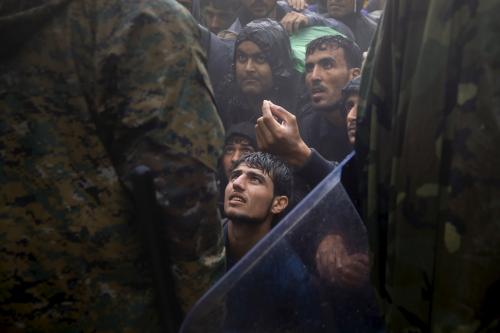
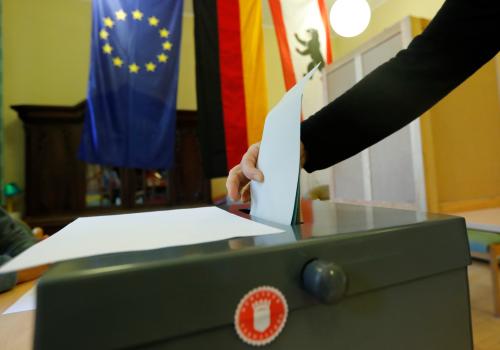
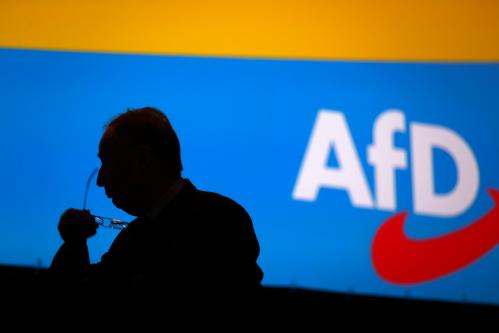
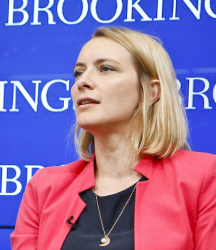
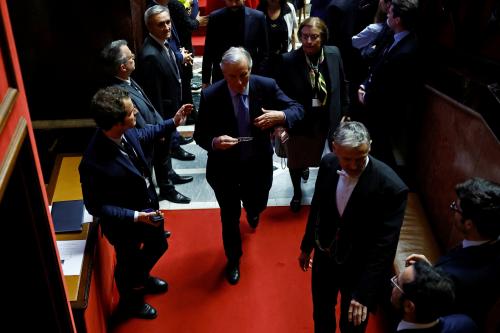

Commentary
Europe votes: France’s atomized politics and vaporized influence
May 22, 2019